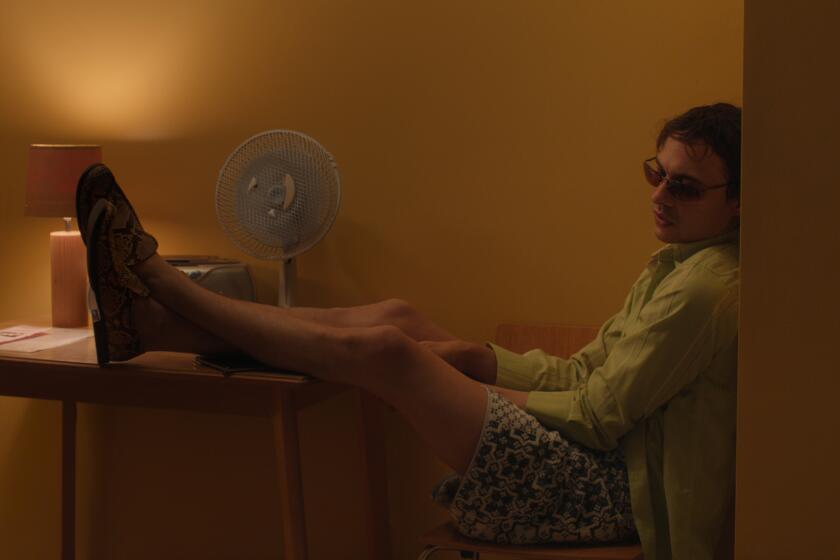The highs and lows of this year’s Telluride Film Festival
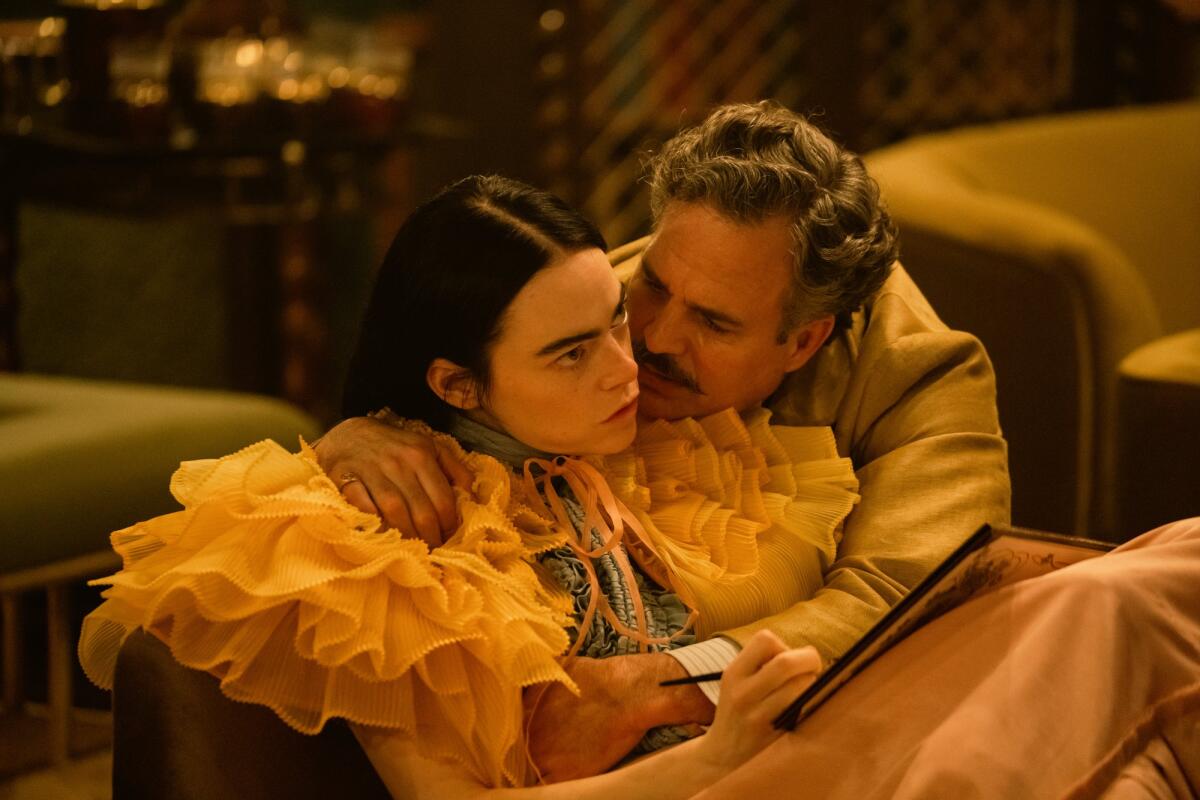
- Share via
TELLURIDE, Colo. — On the occasion of its 50th anniversary, the Telluride Film Festival unveiled a mammoth five-day lineup (Aug. 31–Sept. 4), packed with world-premiere titles like Andrew Haigh’s “All of Us Strangers,” starring Andrew Scott, the “hot priest” of “Fleabag”; Emerald Fennell’s psychothriller “Saltburn” with Barry Keoghan; and Alexander Payne’s Christmas comedy “The Holdovers,” which reunites him with his “Sideways” star Paul Giamatti. Times columnist Glenn Whipp and film critic Justin Chang sat down to discuss the films they saw and missed, loved and hated, and what they portend for a movie industry still being affected by the writers’ and actors’ strikes.
GLENN WHIPP: Standing in line to see the Saturday evening premiere of “Poor Things,” Yorgos Lanthimos’ audacious inquisition into what it means to be human (as well as how a crossbred duck-dog might act), I bumped into director Emerald Fennell, and we got to talking about how her movie, the button-pushing psychological thriller “Saltburn,” had gotten people talking.
“I think we can all relate,” she said of her film. Relate to what, I wondered. The feelings of envy that the main character in “Saltburn,” played by Barry Keoghan, nurses toward cool, rich kids ignoring him at Oxford? Of being an outsider, looking in?
“I think just the wanting,” Fennell said. “Aren’t we all wanting? More cinema. More beauty. More, more, more. Look around.” I did as instructed, taking in the crowd of people standing outside an elementary school gymnasium that, for a few days a year, is converted into a movie theater showing some of the season’s most anticipated films. Oscar-winning filmmaker Steve McQueen was standing behind me, waiting patiently, as the festival’s biggest donors were ushered in. (“The super patrons must be served,” he said without a trace of resentment.)
What are all these privileged people wanting? Another great cinematic offering? A heavier Patagonia fleece to counter the cold mountain air? A decent margarita to toast the dearly departed Jimmy Buffett?

I have to say, Justin, that after five full days at the festival’s expanded 50th anniversary edition, I am left wanting nothing. I leave Telluride with a lighter wallet and a deeper conviction that, in the midst of the studio greed-engineered dual labor strikes of writers and actors, we are enjoying a richly rewarding year for movies, one of the best in a very long time.
I’m not sure I’ve had a better day at a festival than my Friday quadruple feature. It began with “Wildcat,” Ethan Hawke‘s sensitive evocation of the life and work of writer Flannery O’Connor, then moved to Jonathan Glazer’s chilling Holocaust film “The Zone of Interest,” then on to Aki Kaurismäki’s delightful, deadpan romance “Fallen Leaves” and ended in a puddle of tears with Andrew Haigh’s sublime ghost story, “All of Us Strangers.”
The wrinkle? Midday, I was sitting in Telluride’s Werner Herzog Theatre, looking for a friend minutes before a showing of what I thought was going to be Alexander Payne’s “The Holdovers,” only to discover that I was in fact about to see “The Zone of Interest,” which is most definitely not a wry, melancholy comedy starring Paul Giamatti. Film festivals are often elevated by moments of serendipitous discovery. Here my carelessness led me to a quick, necessary recalibration of expectations, which may have made Glazer’s depiction of the ordinary, daily lives of Auschwitz commandant Rudolf Höss (Christian Friedel) and his family all the more disturbing. “The Zone of Interest” left me wanting nothing, Justin, except perhaps to wonder at humans’ capacity to tolerate evil when it aligns with their comfort and interests.
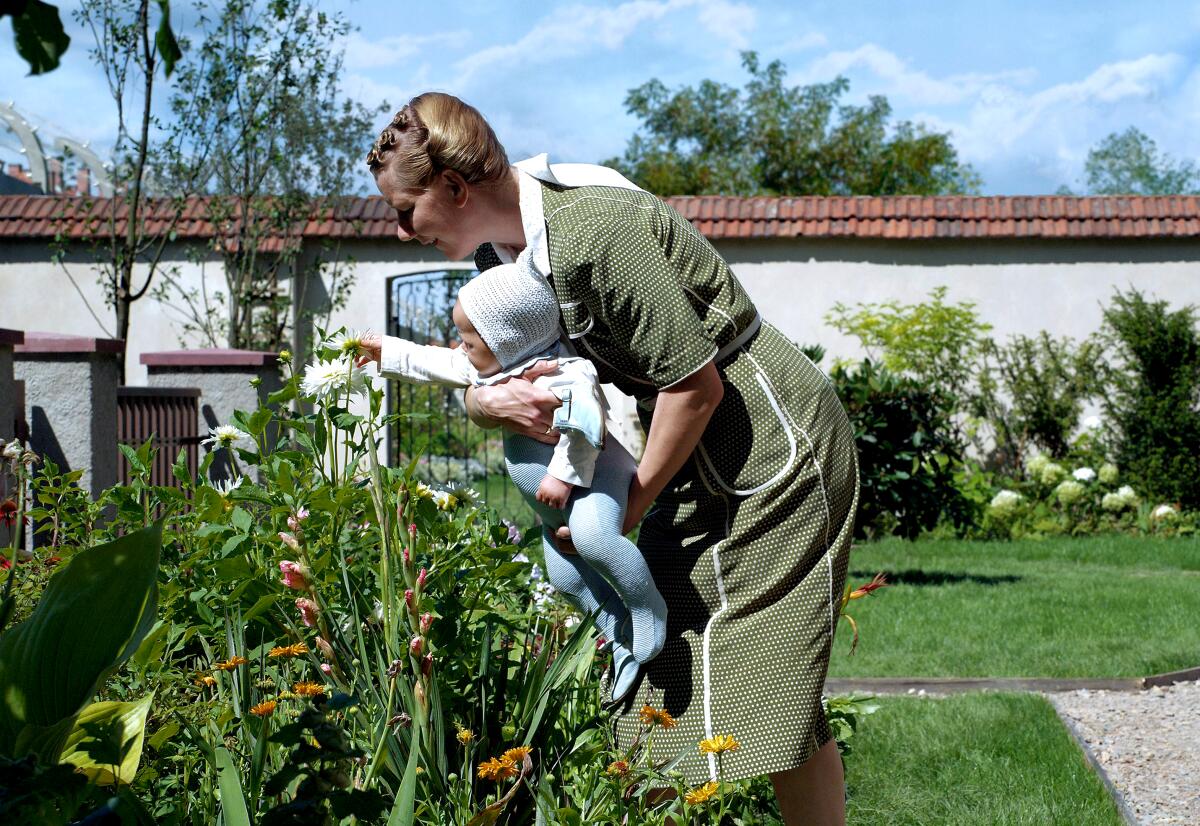
JUSTIN CHANG: Sitting down for “The Holdovers” and getting “The Zone of Interest” instead sure sounds like my idea of serendipity, although there are many at Telluride who would feel the opposite. And I can’t say I’d blame them, under the circumstances. Anyone expecting to see a sweet-and-sour Christmas comedy from one of American cinema’s most vaunted humanists would be rightly jolted by those destabilizing opening minutes of pitch-black screen and Mica Levi score — the blood-freezing prelude to one of the most oblique and insinuating Holocaust dramas ever made, if we even care to attach that label to Glazer’s slow-drip study of the psychology of mass murder.
We are in the midst of a great year for cinema, Glenn, and “The Zone of Interest,” already widely acclaimed and laureled at Cannes, sits near the top of the list for me. I’m especially pleased that Glazer’s movie seems to have enjoyed a much better Telluride reception than the one that greeted his previous feature, “Under the Skin.” That movie, now rightly recognized as a masterpiece, had a famously rocky landing here in 2013, at Telluride’s 40th-anniversary edition, where audiences didn’t exactly warm to the disturbing, plot-free spectacle of Scarlett Johansson as an alien temptress sucking men’s bodies dry. Whatever they may have been wanting, Glenn, it certainly wasn’t that.
Which is not to suggest that Telluride audiences are all hopeless cine-philistines (only some of them!) who routinely reject dark, adventurous, challenging art in favor of blandly sentimental comfort food. Certainly, the latter description isn’t entirely fair to “The Holdovers,” a not-home-for-the-holidays comedy that means to warm your heart (and sometimes succeeds) but has plenty of the spiky, acerbic edges you expect from a Payne joint. I can’t say I loved it, though, evocative 1970s wintry-doldrums setting aside. Giamatti tears into his professor role with unsurprising comic gusto but little of the rich pathos he brought to Payne’s “Sideways,” and I didn’t care for the blunt, mechanistic way the movie handles the grief of its other principal characters, an ornery student (Dominic Sessa) abandoned by his family and a cafeteria worker (Da’Vine Joy Randolph) who lost her son in Vietnam. The actors are very good, Randolph especially, but only rarely do they touch chords of feeling beyond the machinations of David Hemingson’s redemption-doling script.
This is the unfairest of segues, but there was at least one great boarding-school drama at this year’s festival: “Zero for Conduct,” Jean Vigo’s brilliant and influential drama of youth in revolt, which had a retrospective screening here (introduced by McQueen, one of the festival’s guest directors). Released in 1933 to a famously hostile French reception, it was one of the oldest movies to screen in Telluride, but its joyous cinematic invention and proudly anarchic spirit haven’t aged a day.
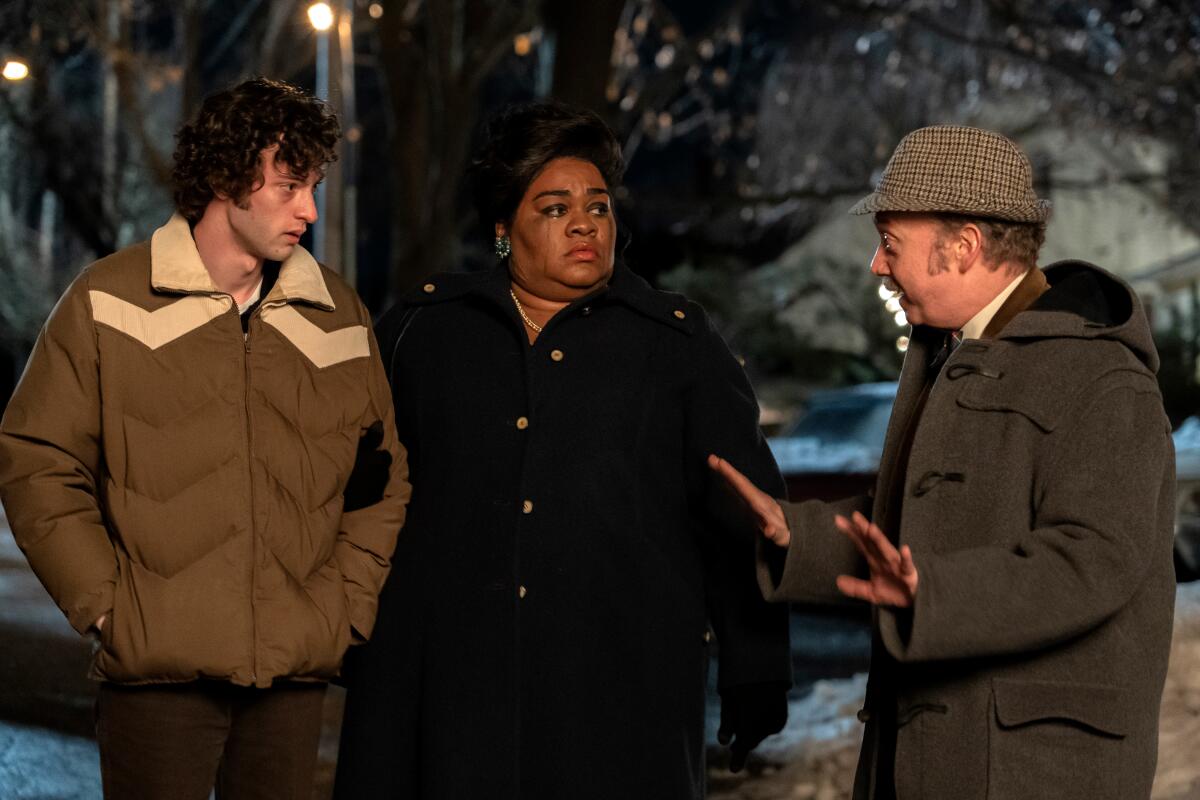
WHIPP: I found “The Holdovers” to be a pleasant enough hang, but I’m also a sucker for movies set during the holidays. And with Randolph’s character in charge of the music during a Christmas party, we were given the gift of the Temptations’ rendition of “Silent Night.” That and the acting — Sessa’s impressive film debut hints we’ll be seeing much more of him — were enough to make my spirits bright.
Payne’s movie was one of several at the festival focused on grief, not surprising given the last couple of years. Andrew Haigh’s “All of Us Strangers” is set in a near-empty London apartment complex that may well in fact be purgatory. I have thoughts, which I shared with Haigh on Saturday, seated next to him waiting for “Poor Things” to begin. “There are no wrong answers,” he said, then smiled. “Besides, I’m never going to tell.” At the very least, his film, the best one I saw during the festival, is a moving depiction of a man (Andrew Scott, superb) working through trauma. Beyond that, its depiction of a sweet hereafter will forever be fixed in my memory.
As for “Poor Things,” it’s wild and inventive and, unlike previous Lanthimos’ efforts, seems to actually like its female protagonist — an audacious Emma Stone, who starts out playing an infant in the body of a full-grown woman and rapidly progresses to a person horrified by the world’s brutality. There’s an awful lot of sex (a.k.a. “furious jumping” in the script’s language), so much that it has left some more bothered than hot. Me? I think it sex onscreen can be a natural, zesty enterprise and welcome its return, particularly when it’s depicted with the kind of charming, lustful abandon as it is here. (The prurience in “Saltburn,” by contrast, feels designed only to shock, which, of course, makes it less provocative and, unfortunately, less interesting.)
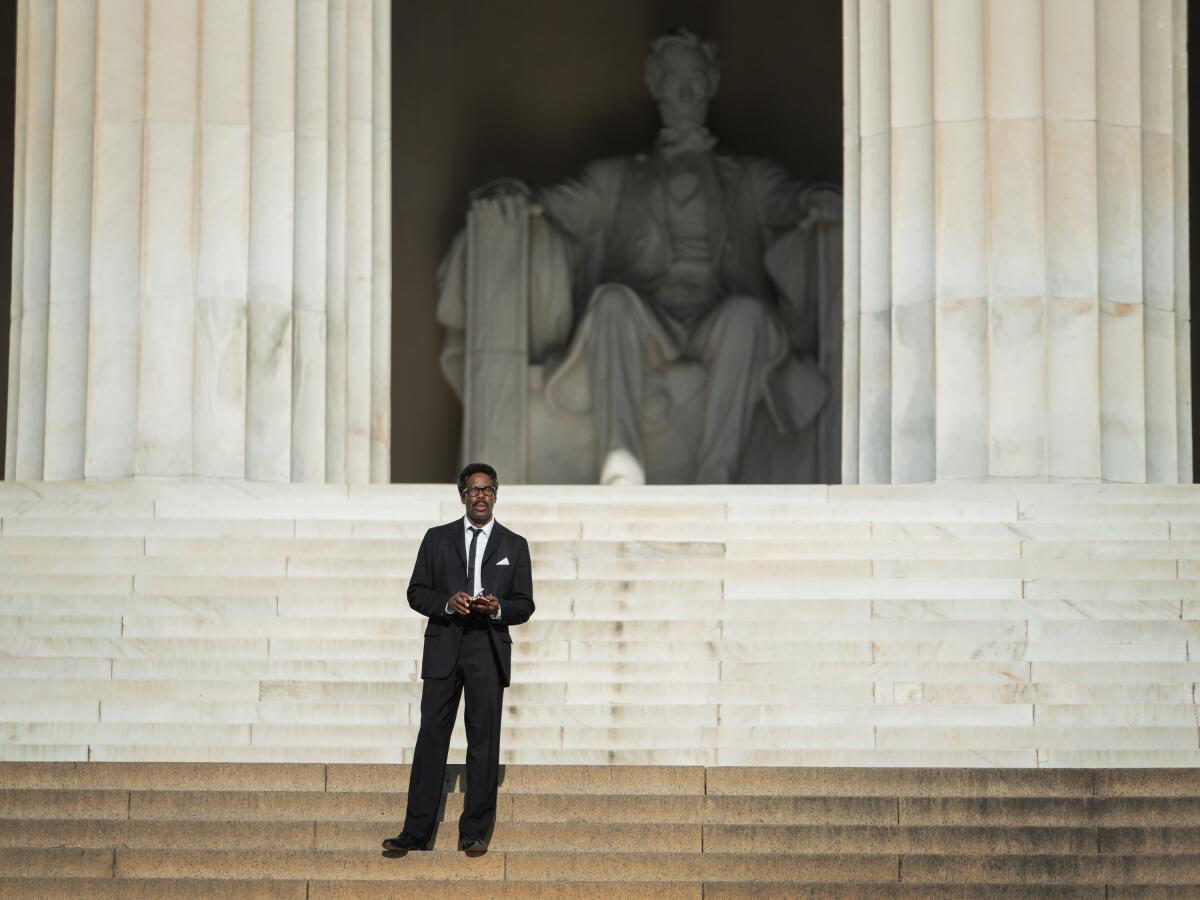
For those wondering if there were more conventional movies at the festival, Netflix offered two biopics. “Rustin” is an informative and at times moving portrait of civil rights activist Bayard Rustin, the man who organized the massive March on Washington in 1963. Over a dinner with Ethan Hawke celebrating the wonderful movie “The Taste of Things,” he professed his love for “Rustin.” “I didn’t really know anything about Rustin,” I told him. “Me neither,” he answered. “And that’s on our education system.” The film and Colman Domingo’s riveting turn as the openly gay title character should do much to correct that.
And then there was “Nyad,” an inspirational sports movie about long distance swimmer Diana Nyad’s historic 110-mile, 53-hour swim from Cuba to Florida. Annette Bening plays Nyad, who was 64 when she finally succeeded, as an egotistical, difficult, determined obsessive — and how many times do you get to see a woman like that as the star of a movie? Bening’s fierceness is matched by Jodie Foster, who is terrific as Nyad’s loyal coach and bestie. Nyad is a controversial figure, and some aspects of this marathon swim have come under scrutiny. But her message resonates: There’s no expiration date on chasing your dreams. I’m just aiming to replicate Foster’s abs when I turn 60.

CHANG: I’m delighted to hear that you loved “All of Us Strangers” and “Poor Things,” Glenn. They were, for me, the two best new movies to screen at Telluride this year, and I’m already looking forward to seeing them both again. Between them too they contain enough furious jumping to take the chill off the upcoming fall season (and anger all those sex-scenes-are-bad puritans who proliferate on social media). So does “Saltburn,” of course, with its bathtub masturbation, moonlit seductions and full-frontal dancing. Neither of us may have cared much for the movie in the end, but per your conversation with Fennell, she has a gift for dramatizing insatiable desire with palpable intensity.
There were also movies at Telluride that showed us the uglier side of that desire. The violence (and threats of violence) that men inflict on women every day supplies the tense and beautifully sustained thematic undercurrent of Kitty Green’s “The Royal Hotel,” a psychological thriller about two young travelers (played by Julia Garner and Jessica Henwick) who, on summer holiday and desperate for funds, join a work program that involves running a pub in the middle of the vast Australian outback. There, they must grapple with leering (and worse) male customers and an atmosphere of free-floating sexual menace.
A variant of that dread coursed through Green’s 2019 debut feature and earlier Garner-starring Telluride entry, “The Assistant,” a quietly damning psychological drama about the crimes of a Harvey Weinstein-style movie mogul. “The Royal Hotel” grows out of a similar abhorrence of rape and misogyny, and while it’s much more of a genre piece, it proves similarly restrained about what it chooses to show, in terms of the violence that its characters endure and eventually inflict. Not that such restraint is automatically a virtue: I won’t spoil the delicious climax of “The Promised Land,” Nikolaj Arcel’s absorbing historical drama pitting an 18th-century Danish potato farmer (Mads Mikkelsen) against a tyrannical landowner (Simon Bennebjerg), but suffice to say that it’s been a while since a villain has gotten so satisfying a comeuppance.
‘Am I embarrassed to have inflated my own record when my record is pretty good on its own? Yes, it makes me cringe,’ legendary swimmer Diana Nyad told The Times, days before the premiere of ‘Nyad.’
You began this conversation, Glenn, with a thought about wanting — a condition that animates movies as different and marvelous as “Poor Things,” in which Emma Stone experiences the satisfactions (and frustrations) of lust and lucre, and “La Chimera,” Alice Rohrwacher’s Cannes-premiered adventure story starring Josh O’Connor as a modern-day treasure hunter. Both Stone and O’Connor were among the actors keeping a low profile on the ground here in strike-affected Telluride, though some did make public appearances, having either secured the necessary interim agreements or having starred in international productions not beholden to strike restrictions.
And so it was a joy to see the great German actor Sandra Hüller bask in the glow of a warm post-Cannes reception for “Anatomy of a Fall” and “The Zone of Interest,” and to see Maya Hawke, who plays O’Connor in “Wildcat,” clasp hands and exchange warm words with director Tran Anh Hung (“The Taste of Things”). And to hear Dakota Johnson wryly correct the person who introduced her before a screening of “Daddio,” noting, “That’s not the first time I’ve been introduced as Dakota Fanning.”
To answer your question, Glenn, I’d say that I want more: more of these lovely, unguarded moments in the future, which is to say a time when the strikes have been lifted, the writers and actors (among other screen artists) have secured the remuneration they deserve and the festival season can feel truly festive again.
More to Read
Only good movies
Get the Indie Focus newsletter, Mark Olsen's weekly guide to the world of cinema.
You may occasionally receive promotional content from the Los Angeles Times.









